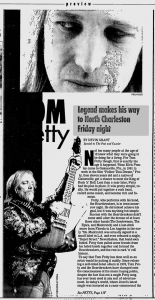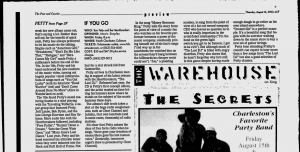Tom Petty: Legend makes his way to North Charleston Friday night
By Devin Grant
Charleston Post & Courier - Thursday, August 14, 2003
Not too many people at the age of 12 knew what they were going to be doing for a living. For Tom Petty though, that is exactly the age it happened. When Elvis Presley came to Gainesville, Fla., in 1961 to work in the film "Follow That Dream," Petty, then eleven years old and a native of Gainesville, got a change to meet the King of Rock 'n' Roll. Less than a year later, Petty had his plan in place. It was pretty simple, really. He would put together a rock band, record some music, and become rich and famous.
Petty, who performs with his band, the Heartbreakers, is in town tomorrow night. He did indeed achieve his goal, but it was anything but simple. Success with the Heartbreakers didn't come until after the demise of at leas three other bands (The Sundowners, Th Epics and Mudcrutch) and a last-ditch move from Florida to Los Angeles in the early '70s. Mudcrutch was actually signed to a small label in L.A. and even released a single, "Depot Street." Nevertheless, that band soon folded. Petty then pulled some friends from his failed bands together and formed the Heartbreakers, and the rest is rock 'n' roll history.
To say that Tom Petty has done well as an artist would be putting it mildly. Since releasing a self-titled debut album in 1976, Tom Petty and the Heartbreakers have clamped onto the consciousness of the music buying public, despite the fact that not a single Petty song has ever been used in any sort of advertisement. In today's world, where Jewel's latest single was featured on a razor commercial the week her new album came out, that's saying a lot. Rather than sell out for the benefit of quick case, Petty has always preferred to let his music do the talking. Singles such as "American Girl," "Breakdown," "Don't Do Me Like That," "Refugee" and "Here omes My Girl" made Petty a millionaire before the end of the '70s. In the '80s, Petty and his band embraced the new medium of the music video, turning out hugely popular visual interpretations of songs such as "You Got Lucky" (with its futuristic "Road Warrior" feel) and "Don't Come Around Here No More" (Alice in Wonderland on acid).
The '90s found Petty's sound maturing thanks to a stint playing with the Traveling Wilburys, a super-group that featured Petty, Jeff Lynne, Bob Dylan, and the late George Harrison and Roy Orbison. More radio hits with the Heartbreakers followed, including "Free Fallin'," "Runnin' Down a Dream," "Into the Great Wide Open," and "Mary Jane's Last Dance." Last year, Petty and his band received the ultimate honor when they were inducted into the Rock and Roll Hall of Fame. Not bad for a star struck kid from Gainesville.
Petty arrives in Charleston touring in support of his latest release with the Heartbreakers, "The Last DJ." Released last year, the CD is Petty's first concept album, and the artist wasted no time letting his listeners know where he stands on the subject of the music business these days.
The album's title track takes a shot at the huge radio conglomerates, such as Clear Channel and Infinity, that own hundreds (and in some cases, thousands) of radio stations.
It's clear that Petty misses the days of free form radio when he sings, "there goes your freedom of choice/there goes the last human voice." (Ironically, tomorrow night's show is presented by Clear Channel).
In the song "Money Becomes King," Petty tells the story from the point of view of a music fan who watches as his favorite performer becomes a pawn of the music company, eventually pricing himself out of his fan's range ("and way up in the nosebleeds/we watched him on the screen/they'd hung between the billboards/so cheaper seats could see"). "Joe," a plodding number, is sung from the point of view of a fat cat record company CEO who leaves no question as to who is really important in the artist/label relationship ("I'm the hand on the green light switch/You get to be famous, I get to be rich"). But although much of "The Last DJ" is filled with angry diatribes, Petty also slows that he hasn't forgotten why he's still in this game despite having made enough dough to go retire on his own island somewhere. "Dreamville" is a perfect example. It's a beautiful song that begins with its narrator walking down to the music store to buy a new set of guitar strings.
Petty fans attending Friday's concert can expect to hear more than a few songs form "The Last DJ" but also a good selection of Petty classics.


